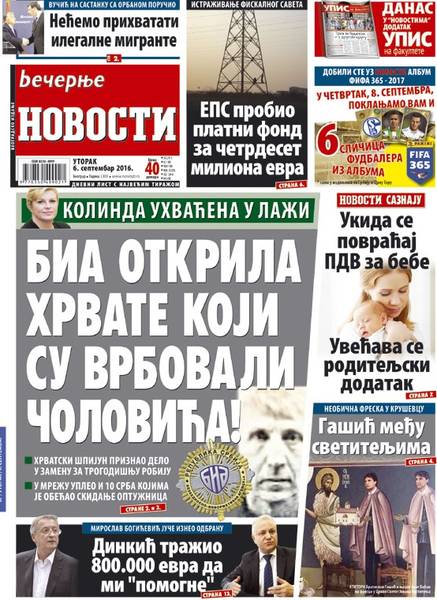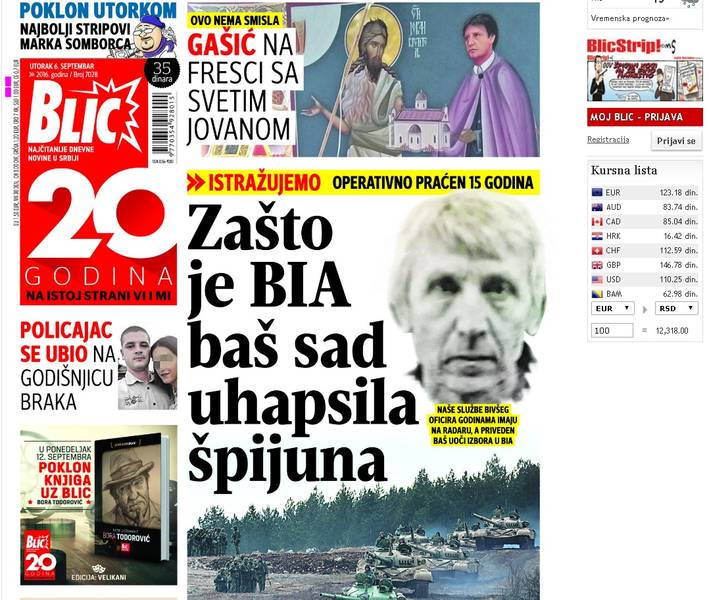Vučić's Orbánisation
Adelina Marini, September 6, 2016
Croatian and Serbian press are paying a lot of attention to the visit of Hungarian Prime Minister Viktor Orbán to Belgrade on Monday. Croatian media quote Mr Orbán in saying that Hungary will not accept anyone and for whatever reason blocking the accession of Serbia to the EU. The focus of Serbian national television RTS, however, is a different one and reveals the Orbánisation of the Serbian PM with regards to the refugee crisis. “I was not as capable as some others. Orbán is more experienced and I am convinced, and I say this without any cynicism, that he has more decisive positions than me. I wished that we, as a government, would demonstrate solidarity and humanity, which we will do in the future as well, but we cannot accept illegal migrants”, said Mr Vučić at a joint press conference with the Hungarian PM in Belgrade yesterday.
In addition to the admission that migrants are making trouble in Serbia, this statement shows that the Serbian PM is making an 180-degree turn compared to his statements of last year, when he wanted badly to be liked by German Chancellor Angela Merkel and supported her “open doors” policy by creating a well-oiled organisation for transiting migrants from the Macedonian border to the Croatian one and then further on to Germany. After securing his grand slam with the opening of the most important chapters of the negotiation process with the EU – 23 and 24 – Vučić got emancipated and adopted a far more  Orbánist tone towards the EU. This is already evident with regards to migrants.
Orbánist tone towards the EU. This is already evident with regards to migrants.
Serbia is opening five new negotiation chapters by the end of the year
Serbian Vecerne novosti reports that regardless of turbulence in the relations between Serbia and the EU, negotiations have not been frozen. Belgrade expects that during the Slovak presidency of the EU, meaning by the end of the year, “at least” five new chapters will be opened – number 5 (Public procurement), 25 and 26 (Science and Education), 20 (Enterprise), and 29 (Customs union). The newspaper expects that negotiations with the EU should speed up starting next week, when European institutions will go back to work after the summer break. As early as September 7th there will be a meeting of permanent representatives, where one of the subjects on the agenda will be Serbia’s European integration. A mission from the EC is also expected in September, which will analyse what has been done so far on chapters 23 and 24.
There is no burkini drama in Croatia
In neighbouring Croatia, on the other hand, there is a happy end to the drama of last week when a woman wearing a burkini on a beach in Split caused turbulent reactions. Regional Croatian daily Slobodna Dalmacija made its own survey, checking whether it is true that intolerance towards those different is raging rampant along Split beaches. A reporter from the newspaper dressed in burkini, but instead of criticism she met complete understanding and even encouraging cheers. The newspaper writes that the reporter “with no fear of being punished by a policeman and made to undress” walked several beaches in Split, only to determine that beach-goers there are friendly.
Croatia is a more developed democracy than the USA

This is the conclusion of Russian chess player and exile Garry Kasparov, who became Croatian citizen two years ago. All Croatian media are copying today the Facebook-status of the champion, in which he shares his opinion on the upcoming parliamentary elections in Croatia on September 11th. In his opinion, Croatia is blessed with the leaders of the two largest political parties - Zoran Milanović and Andrej Plenković. Both men are young, impressive, and well-respected leaders — educated, experienced, and intelligent, multi-lingual and pro-Europe, writes Mr Kasparov in English. Comparing the Croatian main contestants with the presidential candidates in the USA Garry Kasparov concludes that Croatian democracy looks stronger than the American one, for democracy is good only if it offers good candidates.
The war with Serbian media continues
A second round of the controversial exhibition of the party of Serbian PM Aleksandar Vučić “Uncensored lies” is opening in Kruševac. The first round was in Belgrade in July. Back then the exhibition, organised by the Serbian Progressive Party (SNS), was opened personally by PM Vučić aiming to demonstrate there is no censorship in Serbia. The exhibition shows articles, in which Vučić and the rest of the party functionaries are mentioned in a negative context, reports B92. Back then, the two largest journalist organisations criticised the exhibition, describing it as “a pinnacle of cynicism by the SNS and respectively authorities”, which are exerting extra pressure on the already fragile freedom of expression.
The Kruševac exhibition was opened by Interior Minister Nebojša Stefanović, director of the government Office for Kosovo and Metohija Marko Đurić, and former ministers Nikola Selaković and Bratislav Gašić.
The Croatian-Serbian cold war

Serbian media today also dedicate a lot of their pages to the “Balkan spy” affair. Blic places on first page the question “Why is it exactly now that the Serbian security agency has caught the spy?” Which is the straw that broke the camel’s back was the newspaper’s question to analysts. Aleksandar Popov, director of the Centre for Regionalism, told Blic that spies have always been caught, spies were even exchanged between the states, but the capture of Čolović “came in a somewhat strange moment”. Another analyst believes that tension could be lessened only with the mediation of the EU.
The Serbian referendum in Bosnia and Herzegovina
Again Blic offers its readers seven scenarios for the referendum in Republika Srpska of BiH. The first one is that it will be held, the second is that RS will give it up, third possibility is for the Constitutional Court of BiH to ban it, the fourth is that it will change its ruling about the referendum. The fifth possibility is for the High Representative to ban it, and the sixth is that the referendum is allowed, but politicians are punished. And the last possibility is for Dodik and Izetbegović agreeing on a solution.
Bosnian daily Klix publishes today an interview with Bakir Izetbegović, who claims that Serbia is currently acting nervous because of the fact that despite the agreement with Belgrade something is being done in BiH. “For the umpteenth time this is like when the little brother drags his big brother in trouble. Twenty years ago we had unpleasant situations when Slobodan Milošević was trying to stop Bosnian Serbs, but could not manage. After that Serbia had to stand by their positions and take the consequences”, said the president of BiH. In his opinion, Dodik will not receive the support of his friend on the other side of the Drina river to continue making trouble on the Balkans.
Translated by Stanimir Stoev
 Bakir Izetbegovic, Andrej Plenkovic | © Council of the EU
Bakir Izetbegovic, Andrej Plenkovic | © Council of the EU Aleksandar Vucic, Recep Tayyip Erdogan | © Serbian Presidency
Aleksandar Vucic, Recep Tayyip Erdogan | © Serbian Presidency Jean-Claude Juncker, Zoran Zaev | © European Commission
Jean-Claude Juncker, Zoran Zaev | © European Commission